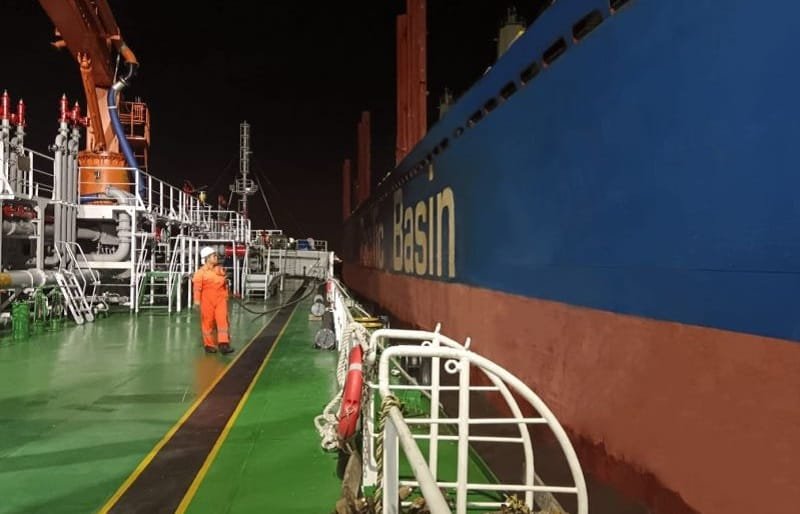In a landmark achievement for the digitalization of marine fuel delivery, TFG Marine has successfully completed its first digitalized bunker delivery in Singapore using electronic bunker delivery notes (eBDNs). This groundbreaking delivery took place in early November at the Port of Singapore, where TFG Marine supplied VLSFO bunker fuel to Pacific Basin Shipping’s Illovo River bulk carrier. This marks the first of four bunkering deliveries this month where TFG Marine has implemented this innovative technology, signaling a significant shift in operational efficiency and transparency in fuel supply.
Table of Contents
Collaboration and Technological Integration with SGTraDex and ZeroNorth
TFG Marine’s successful adoption of eBDNs is the result of months of collaboration with SGTraDex and ZeroNorth, who provided technical support and software solutions. The implementation of eBDNs enhances the traditional bunker delivery process by streamlining administrative tasks, improving digital documentation, and enabling robust data collection. By reducing manual paperwork and increasing accuracy, this new system supports a more efficient and connected bunkering industry.
Kenneth Dam, Global Head of Bunkering at TFG Marine, elaborated on the advantages of this transformation, stating, “We’re especially proud to be pioneering this advanced, end-to-end technology ahead of the Maritime and Port Authority of Singapore (MPA)’s mandatory standards set for April 2025, with plans to expand our rollout to other global locations in the coming months,”
Alignment with Singapore’s Digital Bunkering Initiative
The rollout of eBDNs by TFG Marine aligns with the Maritime and Port Authority of Singapore’s (MPA) broader digitalization objectives, which aim to establish a transparent, secure, and efficient fuel supply chain. In November 2023, the MPA launched Singapore’s digital bunkering initiative, a strategic move designed to enhance collaboration between bunker buyers and suppliers, enable better emissions reporting, and achieve significant time and cost savings. The initiative requires the implementation of digital technologies, like eBDNs, to improve overall fuel supply chain reliability and accuracy.
ZeroNorth’s eBDN solution, which has already been deployed in several barges across Singapore, was rigorously tested by the MPA to meet compliance, functionality, data accuracy, and security standards. The system’s success in Singapore marks a crucial step toward the global adoption of eBDNs, reducing errors and delays while fostering a more efficient and eco-friendly marine fuel supply chain.
Future Global Rollout and TFG Marine’s Role in Industry Innovation
Following its initial success in Singapore, TFG Marine plans to extend the use of eBDNs to other major bunkering locations worldwide, further establishing itself as a pioneer in digital bunkering. This early adoption of eBDNs positions TFG Marine as an industry leader in digital transformation, well ahead of the MPA’s mandatory implementation date set for April 2025.
The benefits of using ZeroNorth’s eBDN solution include increased operational efficiency, minimized manual errors, streamlined workflows, and reduced costs—key factors that are shaping the future of bunkering. TFG Marine’s proactive approach in adopting this technology not only demonstrates its commitment to innovation and sustainability but also reinforces Singapore’s status as a premier global bunkering hub.
About TFG Marine
TFG Marine is a leading international marine fuel supply and procurement joint venture between Trafigura Group Pte, Frontline Ltd, and Golden Ocean Group Ltd. Established in 2020, TFG Marine supplies over 10 million metric tonnes of marine fuels annually across 35 strategic bunkering hub locations globally. The company is dedicated to setting new standards in marine fuel supply, prioritizing transparency, efficiency, and modern technological solutions to support a cleaner and more sustainable industry.
This milestone in digital bunkering marks a new era for TFG Marine and the global bunkering industry as the company leads efforts toward a digitally connected, sustainable marine fuel supply process.
Source TFG Marine

